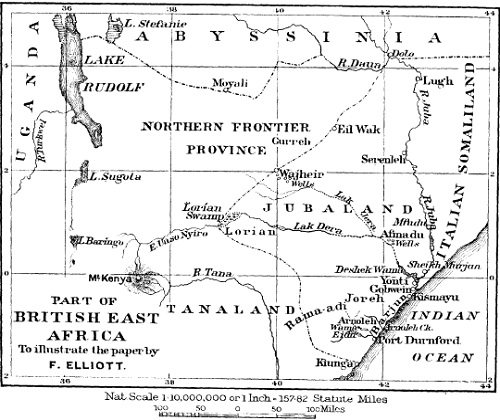
The Bajun district consists of Port Durnford, the sub-district of Arnoleh [Anooleh], and a series of small islands adjacent to the coast. The natives include the Bajun, the Boni, and the Gala tribes.
The Bajun are a race quite distinct from the Somali, and they have their own language and customs. Their local name is Wa-Tikuu. They obtain a living by fishing and marine trading. They claim to be descended from Persian settlers; this is corroborated by the existence in their district of ruined stone houses of distinctly Persian architecture, and also by their light complexion and regular features.
The Boni tribe formerly lived in the Gurreh [Garre] country on the borders of Abyssinia, where their sole occupation was that of hunting. Gradually they spread southward until they reached that part of Jubaland then inhabited by the Gala, who are locally termed the Wurday. With this tribe they made an agreement that they should be allowed to live and hunt in the districts of Afmadu and Deshek Wama, under condition that one tusk of every elephant killed should be handed to the Gala.
Jubaland Wa-gosha village
When the Somali and the Gala began fighting the Boni were neutral, but when the former proved victorious the Boni retired into the thick bush, where for two years they lived on game. Subsequently they made with the Ogaden Somali a similar arrangement to that which they had formerly made with the Gala, and this arrangement is still carried out. They now have settlements in Arnoleh [Anooleh] and the hinterland of Port Durnford. In physique they are in no respect like negroes. Oppressed and persecuted by the young Somali, they have become extremely timid and shy of strangers. If a traveller approaches one of their villages, the whole population takes refuge in the thorn bush, where it is quite impossible to track them. Their weapons are bows with poisoned arrows. This poison they obtain from a scarce tree called Wabaiyu, which is a species of Euphorbia. Of late years this tribe has begun to collect the wild rubber around Arnoleh [Anooleh] and to barter it with the Bajun in exchange for cloth. In hunting they have remarkable skill, and their knowledge of the bush is wonderful. When water fails them in the bush they watch the birds, and when they see the birds sitting on yak trees in any numbers, their experience tells them that water will probably be found in the hollows of some of the trees.
These yak trees have thick stunted trunks in which large cavities are often to be found. The branches of the trees spring from the circle of living wood round the cavities.
The marriage customs of the Boni are very simple. When a young man wants a wife he goes hunting until he kills an elephant, of which the one tusk is for his Somali superior and the other he exchanges for cloth. The cloth is given to the girl`s father, and if it is sufficient in quantity she becomes his wife.
In intelligence the Boni are superior to the Bajun, but not equal to the Gala or the Somali. Their language, which is at present unwritten, somewhat resembles that of the Somali, yet the difference is too great for mutual understanding.
It is noteworthy that a small settlement of Boni, living on the banks of the Juba, have begun to cultivate maize. It is difficult to estimate the number of Boni now living in Jubaland, but probably they do not exceed a thousand. This interesting tribe, who may possibly be the aborigines of the country, are rapidly decreasing in numbers, and in a few years will probably be extinct or merged among the Somali, whose missionaries are busily employed in converting them from Paganism to Mohammedanism.